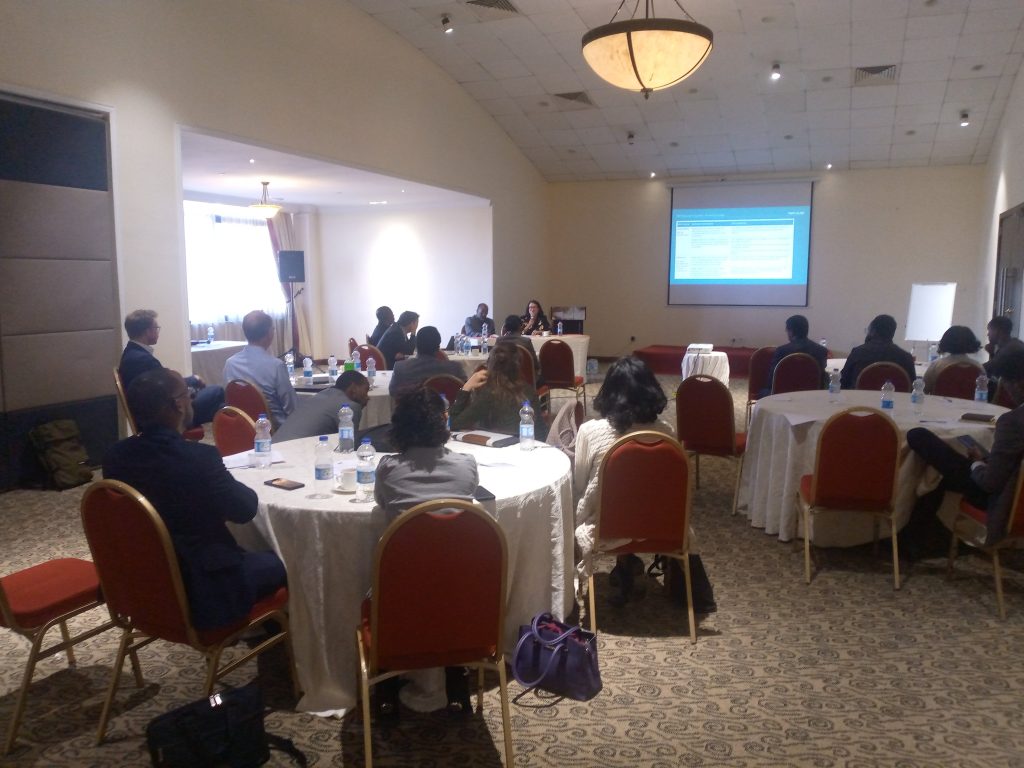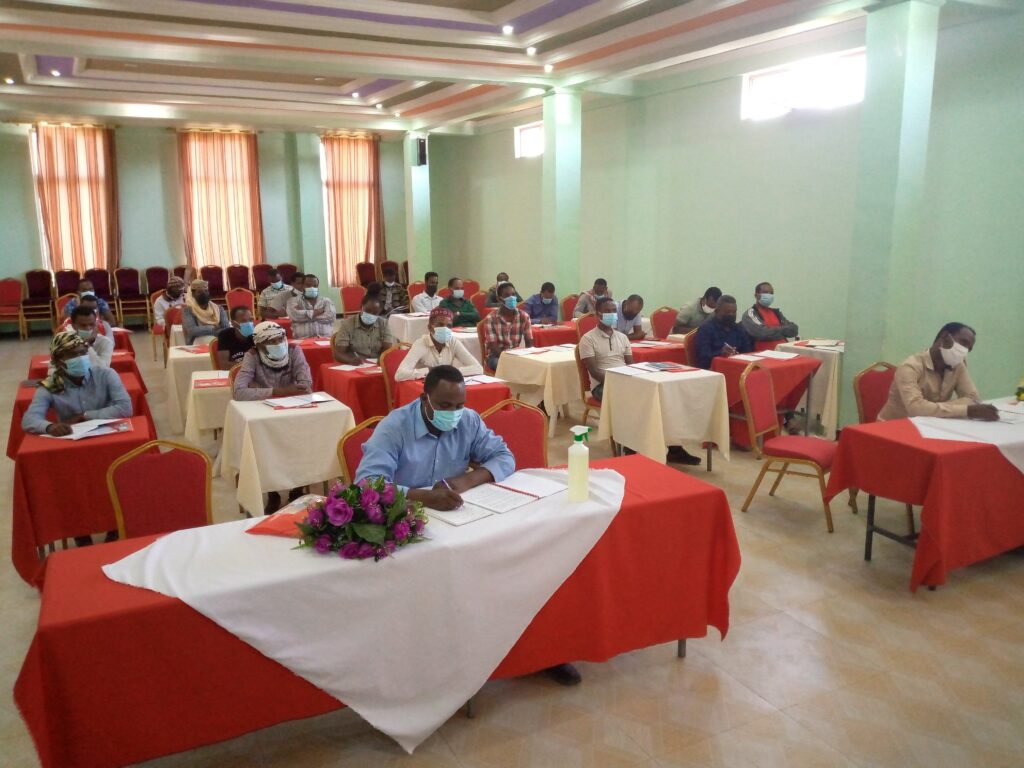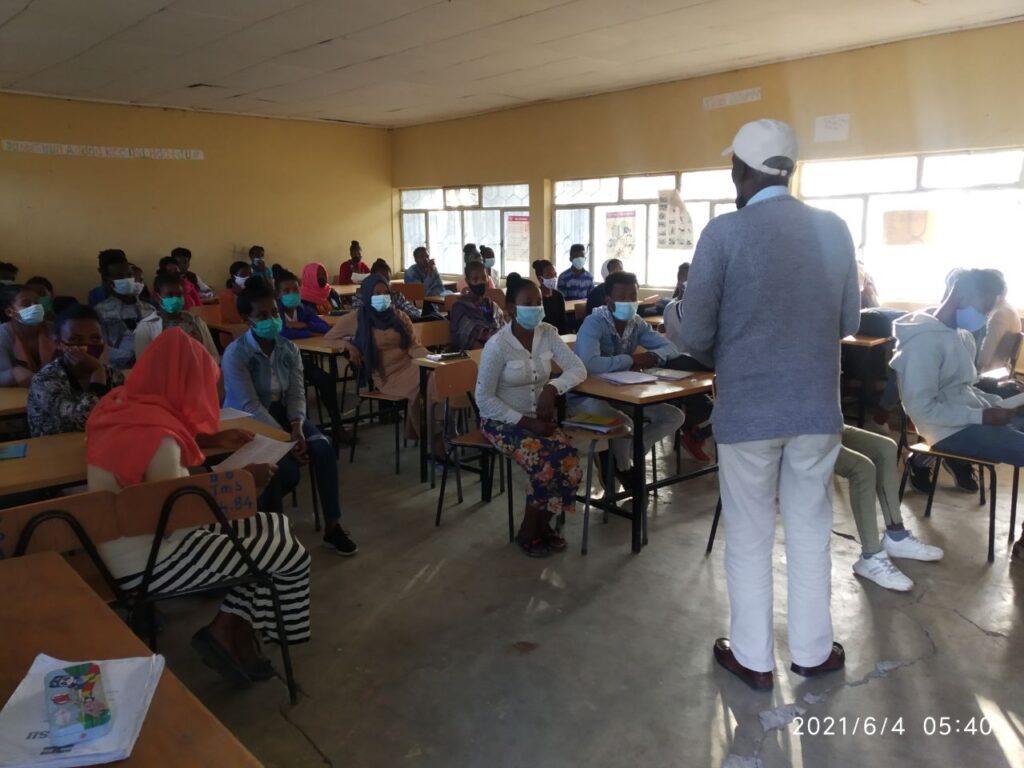Accomplishments
Accomplishments 2022
The following activities have been implemented in the year 2022
Programs
- Conducted voters’ education implementation evaluation workshop so as to identify opportunities and challenges and hence to establish a system of way forward. In the session, five woreda coordinators presented their internal evaluation to the panel and discussed on how to proceed with other related activities in the future;
- Gathered primary data on the participation of women in public decision making in Bereke woreda of the Oromia Region and prepared a consolidated proposal;
- Conducted an intensive capacity building training on the participation of women in the public decision-making processes in Sendafa Beke town in Oromia Region;
- Gathered basic information on the vulnerability of internally displaced persons/IDP’s in Negele Arsi woreda of the Oromia Region and prepared analytical proposal;
- Prepared and published human rights capacity building manual and rights-based dialogue manual, posters and flyers so as to conduct human rights trainings and rights-based peace building dialogue in five sub cities in Sheger City Administration in Oromia Region. Agence Française De Développement/AFD is funding the project;

Consultations
- Attended the Inter Ministerial Task Force briefing on the findings in the conflict in Afar and Amhara Regions. The consultation was organized by the Authority for Civil Society Organizations/ ACSO; Attended a consultation on peaceful resolution of conflict in the northern parts of Ethiopia. The consultation was organized by Addis Ababa University/AAU.
- Attended a consultation on how to establish human rights data protection mechanisms at the national level. The consultation was organized by centre for the advancement of rights and democracy/CARD; Attended a consultation on development of governance and public participation. The consultation was organized by UN Women;
- Attended the third round Universal Periodic Review/UPR consultation workshop organized by Ministry of Justice;
- Attended civil and political rights promotion and protection consultation meeting organized by Ethiopian Human Rights Commission/EHRC;
- Attended a consultation meeting on the impacts of democratic elections on sustainable peace organized by National Electoral Board of Ethiopia/NEBE in collaboration with UN Electoral Assessment Team;
- Attended a consultation workshop to validate a research conducted on fair trail standards in crimes against constitutional order and terrorism and judicial response to GBV organized by Konrad Adenauer Stiftung;
- Attended a consultation meeting with South Korean HWPL delegation on how to promote sustainable peace;
- Attended consultation workshops on the role of youth for sustainable peace organized by Good Governance Africa/GGA;
- Attended a consultation meeting on the role of civic actors for inclusive and sustainable peace organized by Consortium of Civic and voters Education Actors/CCVEA in collaboration with National Democratic Institute/NDI.

Accomplishments 2021
The following activities have been implemented in the year 2021
Voters Education
- Received donation from the International Republican Institute/IRI to conduct voter education in June 2021 national and regional elections in Ethiopia;
- Based on the criteria set by the National Electoral Board of Ethiopia/NEBE, we received a certificate to conduct voter education in Halaba Zone of the Southern Nations, Nationalities and Peoples Region/SNNPR;
- Based on the manual developed by the National Electoral Board of Ethiopia/NEBE, we prepared voter education manual and distributed to the trainers;
- Recruited 28 trainers to conduct voter education sessions and organized a training of trainers/TOT workshop to familiarize the manual with;
- Conducted 156 voter education sessions in 24 peasant associations as well as 5 urban districts and reached 12,560 eligible voters.




Civic Education
- Received donation from Consortium of Civic and Voters Education Actors/CCVEA, a national umbrella organization, to conduct civic education sessions in Bereke Woreda of the Oromia Regional State;
- Developed civic education manual, recruited 6 trainers to conduct civic education sessions and organized a training of trainers/TOT workshop to familiarize the manual with;
- Organized 45 civic education sessions, posted 100 posters and distributed 5,000 leaflets and reached 2,000 citizens.




Consultations
- Attended a consultative workshop organized by The Network of Ethiopian Women’s Associations (NEWA) and UN Women Ethiopia Country Office. The overall objective of the workshop is aimed to strengthen civil society organization (CSOs) so as to engage in leadership and governance in Ethiopia. Specifically, the consultation is aimed to strengthen the capacity and coordination of CSOs working in gender equality and women in leadership and governance and to share some lessons and pointers for improvement in lobbying and advocacy to promote women participation in public and political life particularly in light elections. The workshop brought together CSO representatives from Ethiopia, Tanzania, Uganda and international partners;
- Attended a consultation meeting organized by The Civil Society Resource Centre (CSRC) so as to introduce AGOA as a potential leverage tool for Ethiopian civic societies and private stakeholders. By bringing together various stakeholders such as CSOs, trade unions, private enterprises, chambers of commerce, and academicians, the consultation session sets out to meet the following goals; creating awareness towards the AGOA program as a whole, building inter-industry networks between different private-public stakeholders and initiating a national advocacy campaign;
- Attended a consultative workshop organized by PEV-Ethiopia so as to prevent, mitigate and manage conflicts that may arise during the electoral cycle by assisting non state actors/NSA’s in addressing the root causes of political and election related violence and conflict in Ethiopia;
- Monitored the human rights situation and produced 3 shadow reports, including issuing joint statements in collaboration with various national as well as international human rights institutions.
Accomplishments 2020
Below is a summary of our main accomplishments.
- Promoted organizational objectives as well as human rights protection mechanisms to various national and international stakeholders;
- Recruited new members throughout the nation;
- Formed advisory committees in various parts of the country;
- Participated in stakeholders’ consultation meetings and capacity building workshops;
- Organized training programs for high school students under the theme of ethics and its impacts on societal co-existence;
- Established grass-roots electoral education coordinating committees and recruited electoral education teachers;
- Joined national, regional and international human rights networks and or consortiums;
- Monitoring the human rights situation, including under the current state of emergency;
- Conducted awareness-raising programs and distributed leaflets on how to prevent the spread of COVID-19;
- Participated in national and international webinar discussions on the impacts of COVID-19 on elections, entrepreneurship, gender-based violence, state of emergency, human rights defenders, and counter-terrorism;
- Issued joint statements in collaboration with various national as well as international human rights institutions.
Read more on the details of our accomplishments.
Since its establishment, EIHR has been introducing the organizational objectives to various stakeholders such as Ethiopian government institutions, national as well as international NGOs, diplomatic missions, and international governmental organizations. It has also been expanding its institutional structure to various parts of the country. In addition to its head office at Addis Ababa, EIHR has been widening its membership outreach and recruited more members and formed advisory committees in the capital towns of 10 areas throughout the country. Each committee is mandated to promote organizational objectives as well as to provide advice on human rights issues.
In terms of engagement, we participated in stakeholder’s consultation on the reform agenda of the Ethiopian human rights commission, including various intensive as well as thematic training programs. One of these is a capacity building aimed to contribute to the prevention, mitigation and management of election related conflicts and potential violence in the run up to and the upcoming general elections where the non state actors/NSAs skills will be tested. We also invited to attend the Common Wealth Peoples’ Forums in Kigali, Rwanda. Moreover, we conducted various training programs for high school students under the theme of “ethics and its impacts on societal co-existence”.

Regarding elections, we established grass-roots electoral education coordinating committees at the zonal levels and recruited electoral education teachers. The selection is gender sensitive and hence all of the committees chaired by women. We also submitted all the details to the National Electoral Board of Ethiopia/NEBE so as to get electoral education permit.
With regards to national as well as international networking and partnership, we got membership status in the Consortium of Civic and Voter’s Education Actors/CCVEA, Coalition of Ethiopian Civil Society Organizations for Elections/CECOE, Amnesty International/AI, and World Alliance for Citizen Participation/CIVICUS. In terms of creating a constructive and strategic partnership with human rights stakeholders, we have been working with Rights and Security International UK as a partner on issues related to COVID-19 and hence developed a toolkit with 20 international NGO’s throughout the world so as to monitor the situation of human rights under the state of emergency. Therefore, we have been monitoring the situation under the current state of emergency since 8 April 2020.
We also conducted 22 informative sessions using laud-speakers and distributed brochures developed by OHCHR EAO and Ministry of Health Ethiopia/MOH on how to prevent the spread of the virus via face book and telegram. These sessions are aimed to prevent the spread of COVID-19 with in 9 administrative regions of Ethiopia. Moreover, we are participated on 10 international webinar discussions on issues related to the current pandemic. Particularly, these webinar’s aimed to target the impact of COVID-19 on elections, entrepreneurship, gender-based violence, state of emergency, human rights defenders. The discussions also include the impacts of UN agencies on the protection of human rights during the COVID-19 pandemic in Africa, and to assess the UN counter-terrorism measures on human rights, peace building, and humanitarian and development assistance. The organizations that conducted the webinar’s include, center for human rights at University of Pretoria, OHCHR EAO, Defend Defenders East and Horn of Africa, Pan African Defend Defenders Network, Front Line Defenders, World alliance for citizen participation/CIVICUS, and UN Geneva.
We also issued a joint statement with Ethiopian Women Lawyers Association/EWLA, Consortium of Ethiopian Human Rights Organizations/CEHRO, Ethiopian Human Rights Council/EHRCO, and Association for Human Rights in Ethiopia/AHRE to rescue the kidnapped female students from one of the Universities in Ethiopia. Moreover, in collaboration with CIVICUS, we signed a petition to urge states to implement measures in the context of the rule of law: all responses to COVID-19 must be evidence-based, legal, and necessary to protect public health, non-discriminatory, time-bound, and proportionate. Furthermore, in collaboration with Pan African Human Rights Defenders Network, we signed a petition to urge the African Union Commission to stand against the government of China on its xenophobic, racist, and inhuman treatment of Africans in China.